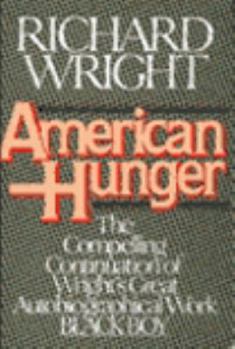American Hunger
Select Format
Select Condition 
Book Overview
American Hunger, published posthumously in 1977, was originally intended as the second volume of Black Boy. This description may be from another edition of this product.
Format:Paperback
Language:English
ISBN:0060909919
ISBN13:9780060909918
Release Date:January 1982
Publisher:HarperCollins Publishers
Length:147 Pages
Weight:0.31 lbs.
Dimensions:0.4" x 5.4" x 8.0"
Customer Reviews
2 ratings
Awakening of a writer
Published by Thriftbooks.com User , 16 years ago
American hunger published in 1944 by Harper & Row is the sequel to Black Boy. Richard Wright( R W ) leaves the South to move to Chicago and later on to New-York city ; it is the period of 1927 to 1937, the period of a young adult , 19 years old to 29 years old. Within 6 chapters and and Afterword by the French specialist Michel Fabre ( about 146 pages ), RW tells us about his efforts to become a writer. We learn that he reads a lot ( 5 hours a day ) books by solid writers like Proust( Remembrances), the American Mercury review in its best years, Gertrude Stein( Three Lives), Stephen Crane (The Red Badge of Courage), Dostoevski ( Possessed). He also begins to practice his writing , working in a cafe or at the post office but spending the rest of his time on practising the craft of writing. It is also an opportunity for him to read sociology and psychology books and develop his critique of American materialistic society. An inspiring text for today college students and junior writers. Strongly recommended.
Excellently written, thoroughly human.
Published by Thriftbooks.com User , 26 years ago
I read this book a few years ago after I found out it was the sequel to Black Boy, a book which made a great impression on me. The same superb prose and insight into the human condition I found in Black Boy continued in American Hunger. I'm a black man. One of the things I hate about this present time is that we black folk have become too used to thinking of ourselves in terms of a color. It's as if we are people attached to a color, not human beings who just happen to be black. Unfortunately I think we are perpetuating this problem ourselves more than anyone is foisting it on us. The thing I most admire about the writings of men like Richard Wright and Ralph Ellison was their portrayal of the black person as just that - a person. A human being dealing with a dilemma. And since all human beings deal with dilemmas that puts us all in the same boat no matter what our racial background. In American Hunger, Richard Wright shows how a black human being coped with a fundament! al problem - being seen as less than but knowing he was more. And he did it in such a way that any human being can identify with him and learn from his experience. This sort of writing is much needed today when it is assumed that a "black" problem can only be understood by black people, thereby putting them on some alien and unreachable level. Wright shows that we are part of the human family, very understandable and "just plain folks" when you get down to it.





